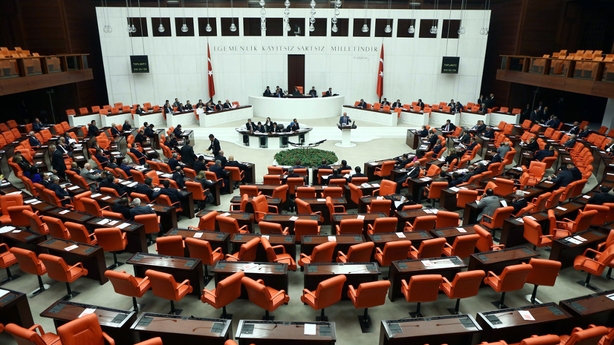Turkey has said it will do whatever it can to prevent the predominantly Kurdish town of Kobane, near its border with Syria, falling to militants from the Islamic State group.
Prime Minister Ahmet Davutoglu said: "We wouldn't want Kobane to fall. We'll do whatever we can to prevent this from happening."
His comments came after parliament gave the government powers to order cross-border military incursions against IS and to allow foreign coalition forces to undertake similar operations from Turkish territory.
"No other country has the capacity to affect the developments in Syria and Iraq. No other country will be affected like us either," Mr Davutoglu said.
 Islamic State fighters advanced to within a few kilometres of the centre of Kobane on three sides yesterday.
Islamic State fighters advanced to within a few kilometres of the centre of Kobane on three sides yesterday.
They have taken control of hundreds of villages around the town in recent weeks. More than 150,000 Syrian Kurds have fled to Turkey.
Their advance to within clear sight of Turkish military positions on the border has piled pressure on the NATO member to take a more robust position against the Islamist insurgents.
But Turkey remains hesitant, fearing military intervention could deepen the insecurity on its border by strengthening Syrian President Bashar al-Assad and bolstering Kurdish fighters linked to the Kurdistan Workers Party (PKK), which has waged a three-decade insurgency against the Turkish state.
Jailed PKK leader Abdullah Ocalan said on Wednesday that peace talks between his group and the Turkish state will come to an end if IS militants are allowed to carry out a massacre in Kobane.
Five Arab nations have participated in the strikes on Syrian soil, while the same number of European countries have committed aircraft to Iraq.
Australian fighter jets have also been authorised to begin striking IS insurgents in Iraq, Prime Minister Tony Abbott said.
Mr Abbott said that Australian special forces troops would be deployed on the ground in Iraq in an "advise and assist" capacity to support the Iraqi army in their battle against IS.
Meanwhile, Canada's prime minister Stephen Harper has sought support for a plan to carry out air strikes to help fight IS.
Mr Harper has said lawmakers will be asked to vote on what has been framed as a six-month "counter-terrorism operation" on Monday.
The Canadian parliament is deeply divided over supporting the US-led international coalition, but Mr Harper's Tory majority is expected to see the vote carried.
It would be Canada's first military expedition since Libya in 2011, although Mr Harper did confirm there would be "no ground combat mission".

